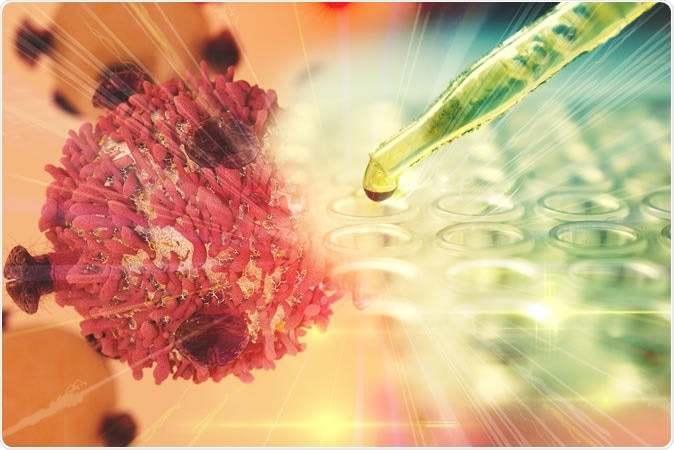In chronic viral infections and cancer, T cell dysfunction is sure to be observed. A new study to be published in the journal Immunity shows that before these cells are completely exhausted, there is a transitory stage in which some cells are present with features that are characteristic of neither the stem-like T cells nor the mature but exhausted T cells.

Illustration Credit: CI Photos/ Shutterstock
Cytotoxic T cells
Cytotoxic T cells or T killer cells are those T cells that carry the CD8 antigen on their surfaces, and which carry out the actual task of killing cancer cells, cells containing viruses, or lethally damaged cells. However, they are hindered in their fight against the cancer cell by different types of cells such as cancer-associated fibroblasts, type 2 macrophages, and regulatory T cells that raise barriers to the immune function of killer T cells. To function effectively and durably in this role, they need to be primed and also activated from their basal state. This is called the tumor immunity cycle.
The first step begins with collaboration between innate immunity cells like dendritic cells and natural killer cells, that offer a nonspecific resistance to the foreign antigen, with CD4-bearing T cells that are responsible for specific immune responses. Once this phase is complete, the effector T cells or CD8+ cells are activated and infiltrate to the core of the tumor or to the site of invasion. This is called the infiltration of the tumor microenvironment. Here they are essential in killing cancer cells.
Exhaustion in chronic viral infection or cancer
Effector T cells have been observed to be exhausted when present in mice with chronic viral infections. The same phenomenon is also seen with CD8+ cells in cancer patients. In such situations, inhibitory checkpoint receptors such as PD-1 are expressed on the surface of these cells. Many new immunotherapy drugs therefore attack these inhibitory receptors, and thus allow the CD8+ cells to get back their function so they can kill virally infected cells and cancers.
Immunotherapy drugs have been used to increase the priming or to reactivate exhausted CD8+ T cells, such as increasing the concentration of stimulatory mediators to overcome the inhibitory effects of tumor-induced T cell receptor binding. This is achieved by using immune checkpoint blockade molecules such as PD-1 (programmed death-1 receptor) ligands and CTL-associated antigen 4 (CTLA-4) to prevent the exhaustion of CD8+ T cells and to re-prime them, respectively. This enables them to kill off the cells that express cancer antigens. Such immunotherapies are part of a broader strategy to make cancer cells more vulnerable to immune action.
Drugs like pembrolizumab and nivolumab which act in this manner are used for some cancers like melanoma, but many more tumors do not respond. The present study is motivated by the need to understand how to recruit and reinforce immune cells into anti-cancer or anti-chronic infection battles. The researchers focused on these transitory cells to find out more about how cancer immunotherapy could be improved.
Transitory population
Earlier studies have shown that all exhausted T cells are far from being the same. In fact, the considerable differences in the different types of such cells could explain some of the differences in the way they respond to immunotherapies used for cancer.
The researchers found that a subset of T cells carrying CD8, PD-1 and Tcf-1 antigens can both self-renew and differentiate into more mature cells. These are described as stem-like T cells. Once the more mature cells are formed, they no longer express Tcf-1 but instead express higher levels of inhibitory molecules like Tim3. These mature cells are divided into two classes, distinguished by their expression or non-expression of the glycoprotein CD101.
The Tcf-1 possessing CD8+ T cells first differentiated into CD101- Tim3+ cells, which later became CD101+ Tim3+ cells. The transitory CD101- Tim3+ cells were capable of proliferation and increased in numbers. They were active against virally infected cells. They also expressed proteins characteristic of effector T cells, such as the chemokine receptor CX3CR1, other inflammatory signalling molecules, and granzyme B.
This subset of mature T cells thus behaved somewhat like stem cells, multiplying when exposed to antiPD-1 drugs. These could self-renew and thus keep the number of exhausted T cells stable but were unable to kill virus-infected or tumor cells by themselves.
The population of mature but truly exhausted T cells could not be rejuvenated by these drugs. This population expresses the CD101 antigen, cannot infiltrate infection sites, and has low amounts of proteins involved in killing off tumor or infected cells.
Distinguishing the truly exhausted T cell
The current study thus defines a transitory T cell population which looks and behaves like cells in between the stem-like and fully exhausted subsets. These can behave as killer cells, helping to control viral numbers. They can also proliferate.
When PD-1 inhibitors were applied, these cells increased in number. This may show that this transitional population has a large role to play in treatment with PD-1 checkpoint inhibitor drugs. These cells could serve as a marker to identify patients who will benefit from such drugs, for instance. Moreover, increasing the survival span or the numbers of these cells, or preventing their transition to full exhaustion, could be a new way to increase the immune response against cancer. The team has also detected other molecules that serve as markers for various degrees of exhaustion in T cells.
Researcher Julia Gersheimer says, “It is extremely exciting to have contributed to this project and know that our findings have the potential to inform cancer immunotherapy.”
Journal reference:
Proliferating Transitory T Cells with an Effector-like Transcriptional Signature Emerge from PD-1+ Stem-like CD8+ T Cells during Chronic Infection Hudson, William H. et al. Immunity, https://www.cell.com/immunity/fulltext/S1074-7613(19)30460-1